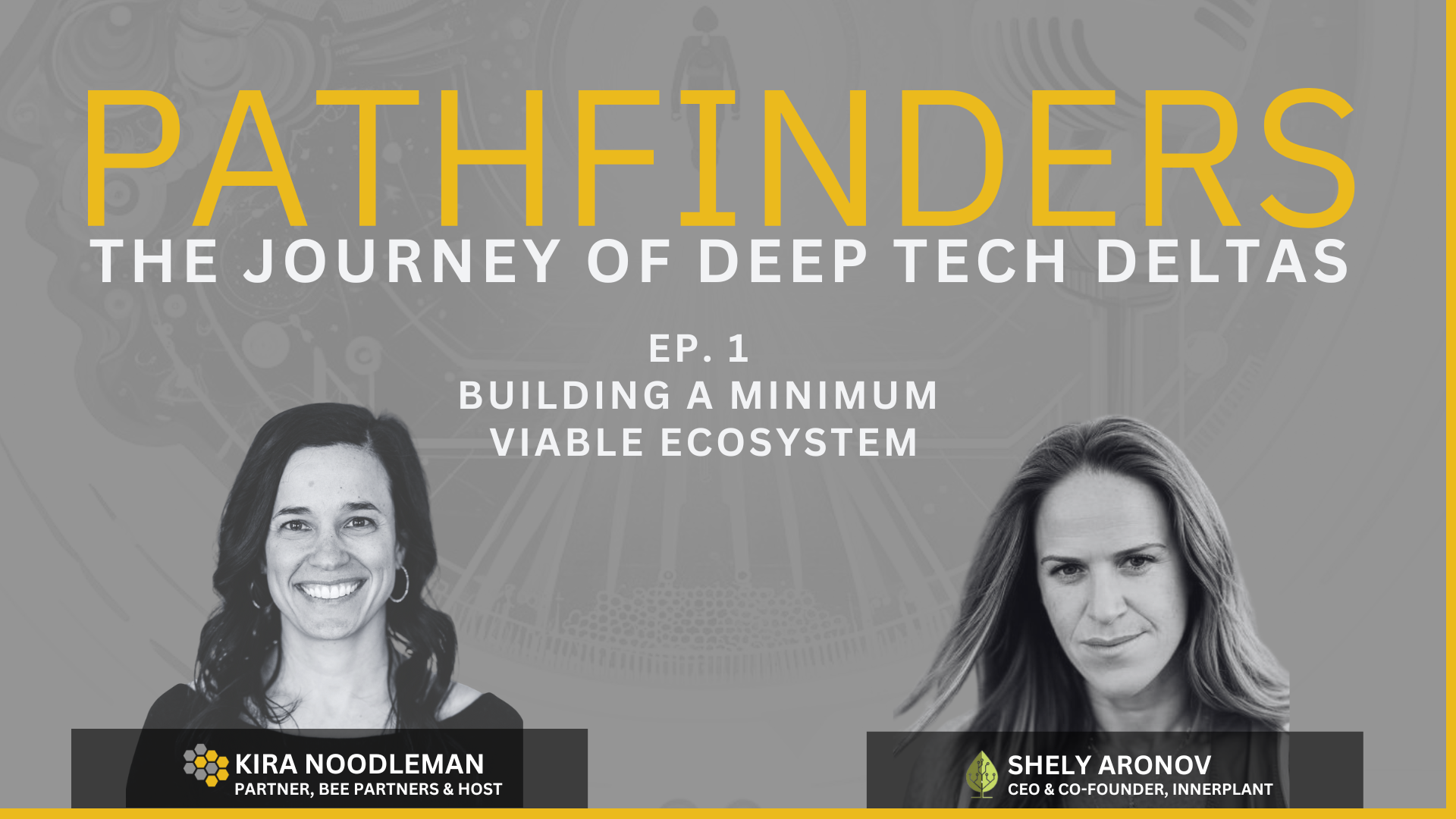What about the agriculture industry makes farmers a uniquely difficult target customer?
In the world of deep tech, innovation isn't just about having a groundbreaking idea. It requires a meticulous approach, strategic partnerships, and an unwavering vision of future market needs. This philosophy shines through in the inspiring story of InnerPlant, led by CEO & Co-Founder, Shely Aronov.
In this first episode of the Pathfinders podcast, we highlight Shely’s journey—marked by the strategic disruptions and transformations in the agricultural sector—offering invaluable lessons for deep tech entrepreneurs and investors alike.
"You have to know where the future is going to be and you have to trust your gut on it."
Shely Aronov - CEO & Co-Founder, InnerPlant
Pathfinders Ep. 1: Shely Aronov of InnerPlant
The Future of Farming
Sensing Market Trends and Making Bets
The success of InnerPlant lies partly in its sharp focus on two significant macro trends in agriculture: the commoditization of inputs and the transition to plant-by-plant treatment. Shely identified these trends early on and developed her business strategy around them.
The commoditization trend was like writing on the wall: as patents on seed technology expire, the market for agrochemicals and seeds becomes crowded with generic products. On the other hand, John Deere's acquisition of Blue River Technology exemplified the transition toward plant-by-plant treatment in large-scale agriculture. Aronov sensed that the agriculture industry was fast approaching a point where technology-driven solutions would become indispensable. By betting on these trends, she ensured that InnerPlant was positioned to offer a vital service to an industry in flux.
Building Ecosystems, Not Just Companies
A cornerstone of Shely’s strategy has been ecosystem building. Recognizing that deep tech startups often face hurdles that can’t be managed single-handedly, InnerPlant focuses on establishing symbiotic partnerships. One of the most significant milestones was bringing in John Deere, which not only led the Series A funding round but also became a critical partner.
The strategy behind these partnerships is two-fold. First, InnerPlant ensured that potential competitors turned into collaborators, serving to augment rather than stifle innovation. Second, by creating what she calls a "minimum viable ecosystem," Shely ensured that the entire agricultural ecosystem—from seeds to satellites to sprayers—was aligned towards seamless operation and deployment of her biosensor technology.
Did you know that while InnerPlant focuses on making sure that every company involved in its ecosystem benefits, it also has a particular emphasis on positive or neutral impact?
The Art of Technical Storytelling
Another crucial element in InnerPlant’s journey has been the mastery of technical storytelling. Given that deep tech companies often reach Series A funding stages without significant revenue, compelling narratives around technology and its potential future impact become pivotal.
Aronov stressed the importance of solving a big pain point for both customers and partners. The narrative isn't just about what InnerPlant can do, but why the technology needs to exist. This approach ensures that potential partners and investors see the long-term value and strategic necessity of InnerPlant's innovations, facilitating smoother collaborations and more robust support.
Conclusion: A Pathfinding Future
Shely Aronov’s journey with InnerPlant underscores the intricate dance of vision, strategy, and partnership in the realm of deep tech. With a pragmatic yet forward-thinking approach, she has positioned InnerPlant not just as a company, but as a crucial component in the next generation of agricultural technology. As she aptly puts it, the job of a deep tech founder is to see where the world will be in ten years and make calculated, insightful bets to build towards that vision. InnerPlant’s story is a testament to how disruptive technology, backed by a well-crafted ecosystem and a compelling vision, can pave the way for an unprecedented future in agriculture.
3 Key Takeaways:
- Focus and Specialization: Defining what business you are truly in. For InnerPlant, it’s about making biotech traits and analyzing data, leaving other facets like satellite launching and ruggedizing equipment to specialized partners. This focus has allowed InnerPlant to allocate its resources efficiently while leveraging the strengths of its ecosystem partners.
- Strategic Partnerships Are Crucial: Partnerships help create a sustainable ecosystem where each partner stands to benefit. John Deere, for instance, supports InnerPlant not to kill the technology, but to see it thrive due to the alignment with its mission.
- Understand Industry Vulnerabilities: Shely strategically identifies vulnerabilities within the agricultural sector, such as the commoditization of agrochemicals and expiring seed technologies. By recognizing these pain points, InnerPlant positions itself to offer innovative solutions that address gaps in the market, making its technology indispensable.
Thanks for reading! For more Pathfinders content, click here, or read more about this industry's anticipated challenges in our Synthetic Biology Insight Paper.



No Comments.